Preserved lemons are a tangy, zippy must-have kitchen staple! This preserved lemon recipe is inspired by Ottolenghi's version in the Jerusalem cookbook. Once you taste a preserved lemon, you'll wonder where this deeply flavorful condiment has been all your life!
You might also enjoy preserved lemon vinaigrette.
For ease of browsing, find all my preserved lemon recipes in one place.

This post contains Amazon affiliate links. As an Amazon Influencer, I earn from qualifying purchases. Your price is never affected.
CONVINCED? Jump straight to the recipe!Reader Rave
"Fantastic new condiment! These are so easy to make, and add zip and complexity to so many dishes. I cook with lemons all the time, and this variation on the flavor is incredible. I used it on my Thanksgiving turkey and wowed the crowd. I just ran out of the first batch that I made, and I am back for more. My lemon tree is in full fruit, so I will make some additional jars as Christmas presents for my friends who love to cook!"
Mary
Reader and Preserved Lemon Lover, Dec 2022
What are preserved lemons?
My husband once scolded me for telling someone a recipe using preserved lemons was really easy. Because, he concluded, who has preserved lemons in their refrigerator except you? The goal of this post is to change that!
What are preserved lemons, you ask?
Preserved lemons are whole lemons, of any variety, that have been packed with salt and lemon juice and left to pickle in a cool dark place for at least a month. Over time, the tartness of the lemon all but disappears but the intense lemon flavor found in the peel remains, making this a deeply flavored condiment.
Though very common in Moroccan and Middle Eastern cuisines, this ingredient is a welcome addition to many dishes.
- Pasta
- Salads
- Salad Dressings
- Marinades
- Stews
- Grilled meats
- Desserts - really!
Why you'll love this recipe!
This Ottolenghi-inspired condiment needs to be in your fridge now and here's why:
- Preserved lemons taste more like lemons than lemons do. Whether you cook Middle Eastern food or not, if you like citrus, this umami-rich version of a lemon will wow your taste buds. (umami is a Japanese term for savoriness and often referred to as the 5th taste in addition to sweet, sour, salty, and bitter)
- It's so easy to make preserved citrus of any kind. You just need clean jars, unwaxed fruit, and kosher salt. And a little patience.
- If you want to add other flavors, you can. Such as fresh herb or peppers or peppercorns, etc.
- Preserved lemons will surprise you in their versatility - from savory to sweet. Check out this article I wrote with my Tasting Jerusalem co-founder, Sarene Wallace in Edible San Fernando Valley. We make blueberry muffins using preserved lemon purée and they are so so good!
Ingredients you'll need
Let's keep this simple: all you need to make preserved lemons is: lemons and salt.
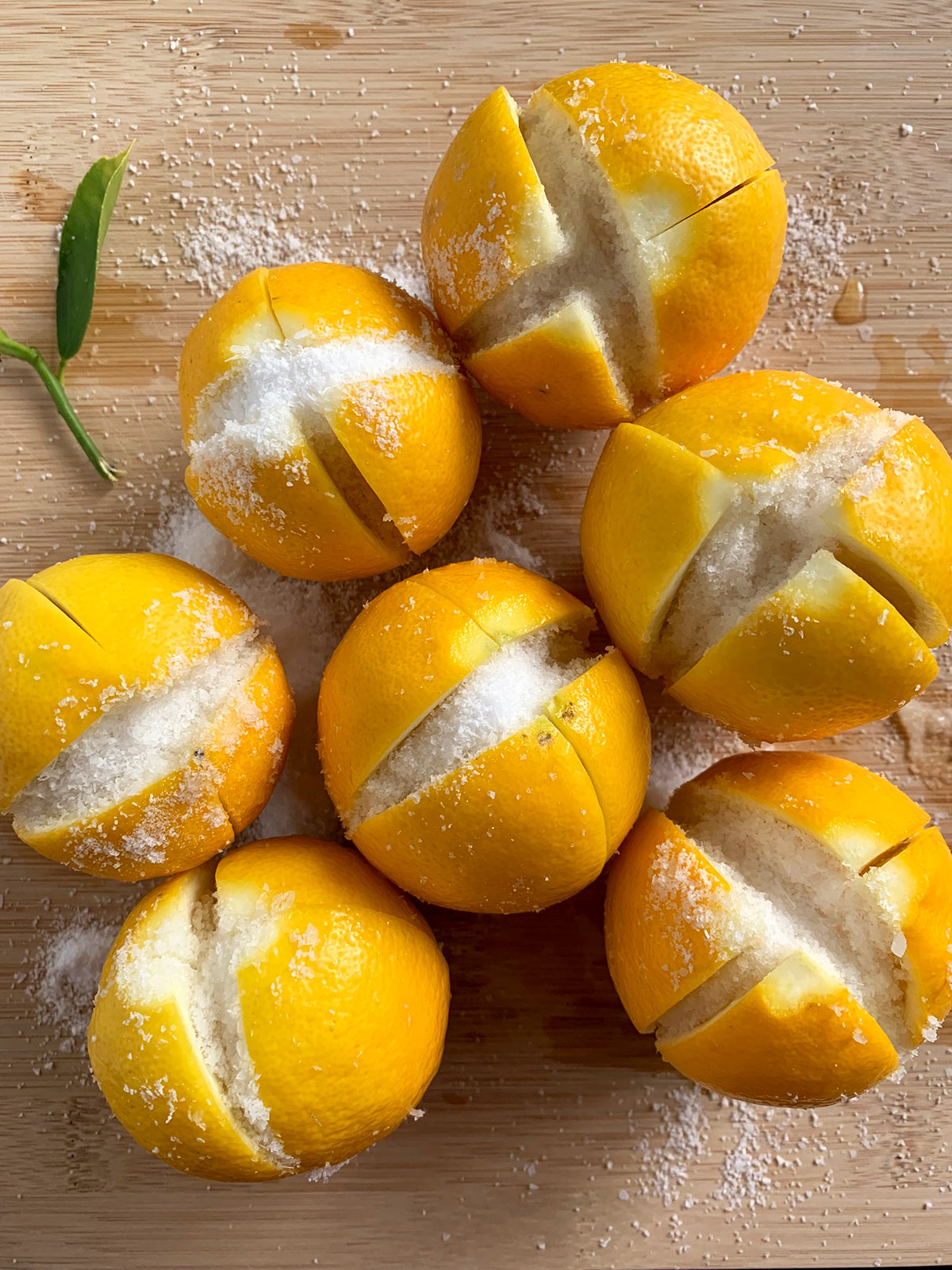
Lemons: The most important thing is to use unwaxed lemons. One way to be sure your lemons are unwaxed is to buy organic. Or have a neighbor (like me) and just pop over and pick some of my Meyer lemons :-). Any variety of lemon will work; some lemons, like a Eureka, have a thicker rind than a Meyer will have. A Meyer is less acidic, though. So try different types of lemons and see what you like the best.
Kosher salt: I used Diamond Crystal but any brand is fine for this application. When baking or cooking, different salts change the salt level dramatically. But for the purpose of preserving citrus, you can get by without exact measurements.
How to make this recipe
(Printable recipe card is at the end of the post with ingredients measurements and step-by-step instructions. This section includes more and larger pictures and high level explanations of the process.)
Grab a quart-sized sterilized glass jar with a lid that seals tightly, your unwaxed lemons and your kosher salt and let's make some preserved lemons!
1. Cut a slit two ways in the lemon about ¾ of the way through it to create a space to stuff with salt. Using kosher salt, add about one tablespoon to each lemon – more or less depending on the size of the lemon.

3. Place them in the glass jar, squishing them in as tightly as possibly without smashing them. At this stage I follow the Ottolenghi preserved lemons method and just close the jar and wait a week. Immediately, you'll see juice appearing in the jar from the lemons.

4. After a week, add enough lemon juice to cover and any flavorings you want to add such as a spicy pepper, rosemary, thyme, ginger, black pepper. Whatever sounds exciting to your palate.

5. Now wait 3 more weeks, leaving the jar in a cool, dry, dark-ish place. After a month, check the lemon juice level and top off with a bit of olive oil to act as a plug to help the lemons stay immersed in the lemon juice. Place the jar in the fridge. They will last for a long time -- except that you will use them so much, that in actuality, they won’t last long at all.

Check out my preserved lemons web story for a quick visual guide on how easy it is to prepare a jar of preserved lemons.

Tool to Use!
Expert tips
- Use kosher salt for the lemons, not iodized salt.
- Some recipes for preserved lemons add the juice to cover the lemons from the very beginning along with the aromatics, rather than waiting a week. This works too!
- Use organic, unwaxed lemons if at all possible. If not, be sure to scrub the outer skins well to remove any coating.
- Remember to store the jar in a cool place, preferably under 70 degrees, until you refrigerate them. Warm environments are not optimal for preservation.
- UPDATE APRIL 2024: There is some new discussion among sources/experts about whether white mold is indeed harmless or not. When in doubt, throw the lemons out! My previous opinion (and what I've always done) was: If white mold develops on any of your lemons, it is generally harmless - just remove/rinse it off. And for sure, any other colors of mold are not good and if you see them, toss the lemons. I have rarely had any issues except a touch of white mold a couple times. And I lived to tell this tale.
Recipe FAQs
Any type of lemon will work. While many use Meyer lemons – beloved for their less sour and acidic juice and more nuanced zest, they do have less acid and a thinner skin than other lemons. Some people prefer the thicker, meatier skins of lemons like Eurekas or Lisbons.
If you use Meyers and want to add more acid to the jar, just use lemon juice from a Lisbon or Eureka lemon when you top off. If you buy your lemons at the store and suspect they are waxed, just give them a scrub with a vegetable brush after dousing them with hot water. You may lose a bit of oils in the rind during this process but it will remove the wax.
Pickled lemons and preserved lemons are essentially the same thing – since pickling by definition is letting something marinate in a salty liquid. However, as Ottolenghi and others have figured out, if you cut the lemons up much smaller, you can create a quick pickled lemon that will carry some of the flavor profile of the month-long preserved lemons but in much less time.
UPDATE APRIL 2024: There is some new discussion among sources/experts about whether white mold is indeed harmless or not. When in doubt, throw the lemons out! Previously, I said: "If you see white mold, remove the white mold and don't worry about it. There is more info about white mold on preserved lemons in this NPR article." If you see mold of any other color, you should toss that jar of lemons. Do not take any chances.
Most people suggest removing all of the pulp (and of course the seeds) and just using the rind. Personally I see no real downside to using the pulp if you are preparing something like a dressing or marinade.
Also, remember there is a saltiness to the liquid and the lemon. So either reduce the salt of the dish you are making or you can rinse off the lemon to remove some of the salty flavor. Taste it so you can gauge.
If you don’t have time to quick pickle some lemons, try lemon zest and salt. Muddle them together in a mortar and pestle or on a cutting board, but only as a last resort. Preserved lemons have a lot more complex flavor than the zest provides.
After the one month incubation period, place the jar of preserved lemons in the refrigerator and they will last almost indefinitely, at least up to a year. And when the lemons are gone, save the liquid to either start your next batch or to put in dressings, marinades, and sauces.
What to cook with preserved lemons
The only limit to using these preserved lemons is your imagination. But start with marinades, dressings, a topping for hummus or other dips, pasta, chicken, fish. Here are a few recipes to get you started:
- Roasted Harissa Potatoes with Preserved Lemon Gremolata
- Harissa Chicken with Preserved Lemons
- Preserved Lemon Hummus
- Preserved Lemon Vinaigrette

Love Middle Eastern and Mediterranean flavors? Join our Facebook group called Sumac & Sunshine!

Buy my cookbook now!
P.S. If you try this recipe, please leave a star rating and/or a review in the comment section below. I so appreciate your feedback! AND find more inspiration on Pinterest, Facebook or Instagram. Signup for my email list, too!

Preserved Lemons, Ottolenghi-style
Beth LeeIngredients
- 6 - 8 lemons Meyer, Eureka, Lisbon
- 6 - 8 tablespoons kosher salt
- 1 cup lemon juice approximately - enough to cover the lemons in the jar after one week
- 1 sprig rosemary optional
- 2 sprigs thyme optional
- 10 peppercorns optional
- 1 spicy red pepper optional
- 2 tablespoons olive oil
Instructions
- Sterilize your 1 qt glass jar canning jar (run through dishwasher, run under very hot water, use your instant pot) - just make sure it is clean.
- Cut 2 slits in each lemon to create a well to put the salt in, being careful not to slice all the way through. (If you do, no big deal, many people preserve quartered lemons. It will work too). Add about 1 tablespoon of kosher salt to each lemon.

- Place the lemons in the glass jar fitting them in as tightly packed as you can.

- Close the jar and let them sit in a cool dry place for about a week. You'll notice juice beginning to accumulate in the jar.

- After a week, open the jar, add your aromatics of choice - thyme, rosemary, peppercorns, coriander, cardamom, star anise, cinnamon, a whole pepper - your taste buds can be your guide. Then cover the lemons and aromatics with enough lemon juice to cover them all and close it up.

- Let it sit out in that cool dry place for 3 or 4 more weeks. You can occasionally shake it about if you'd like. Right before you refrigerate, top with a seal of olive oil, then place in the refrigerator and start experimenting!

Notes
- Some recipes for preserved lemons add the juice to cover the lemons from the very beginning along with the aromatics, rather than waiting a week. This works too!
- Use organic, unwaxed lemons if at all possible. If not, be sure to scrub the outer skins well to remove any coating.
- Remember to store the jar in a cool place, preferably under 70 degrees, until you refrigerate them. Warm environments are not optimal for preservation.
- UPDATE APRIL 2024: There is some new discussion among sources/experts about whether white mold is indeed harmless or not. When in doubt, throw the lemons out! My previous opinion (and what I've always done) was: If white mold develops on any of your lemons, it is generally harmless - just remove/rinse it off. And for sure, any other colors of mold are not good and if you see them, toss the lemons. I have rarely had any issues except a touch of white mold a couple times. And I lived to tell this tale.
Nutrition
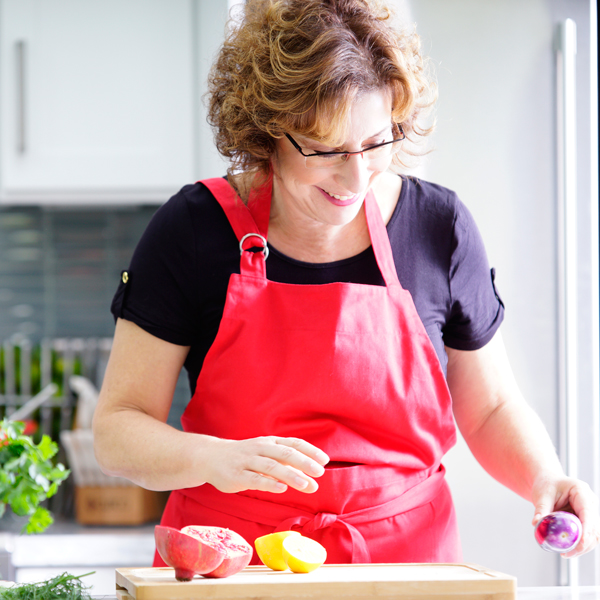
Enjoyed this post?
Sign up for my email list.



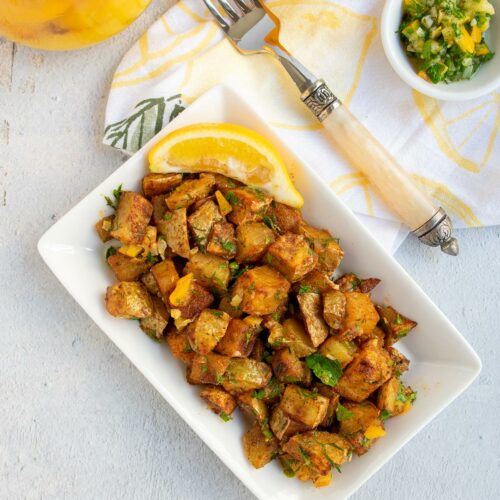
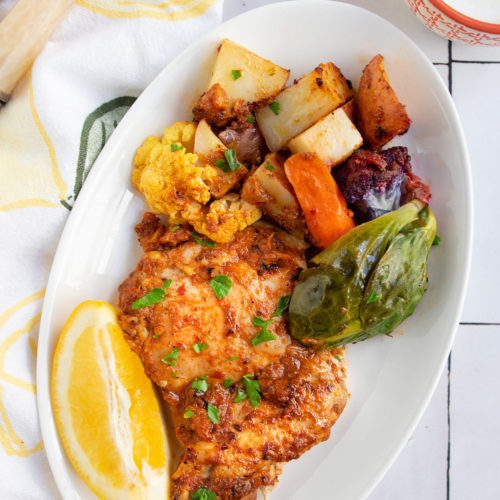
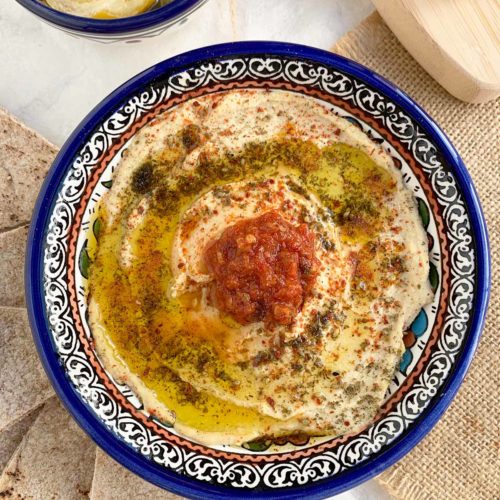
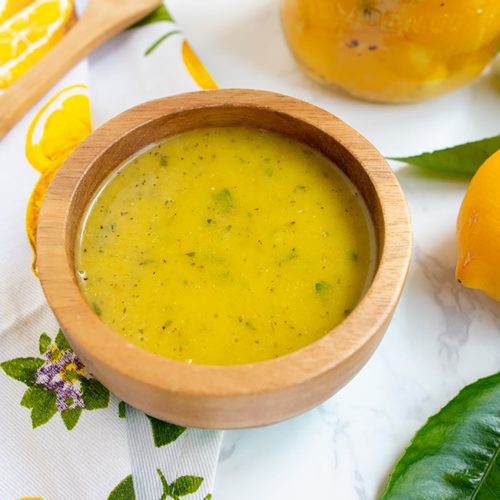







Jenni
What a fantastic, easy-to-follow recipe! I am finding lots of ways to use them, especially once I explored all your links to recipes you use them in. Thank you!
Beth Lee
You're welcome - they don't call me the lemon lady for no reason! And I never tire of talking about them or thinking of new ways to add them to your daily cooking!
Cecilia leete
I got a white mould as you describe and I binned the lot. Only reading this do I realise I may not have needed to. But doesnt it change the flavour? It was even below the surface. It put me off trying again but now I'm about to!
Beth Lee
Try again! I can't really tell why it appears sometimes and not others. I got some on my latest batch too. But I removed it, used the lemons and lived to tell the tale :-). But it is hard to program our brains not to throw out something that is "moldy". I totally get it. Stay in touch and let me know how this batch comes out!
Mary Power-Hall
Fantastic new condiment! These are so easy to make, and add zip and complexity to so many dishes. I cook with lemons all the time, and this variation on the flavor is incredible. I used it on my Thanksgiving turkey and wowed the crowd. I just ran out of the first batch that I made, and I am back for more. My lemon tree is in full fruit, so I will make some additional jars as Christmas presents for my friends who love to cook!
Beth Lee
You've made my day. This is how I feel about them too. It's a flavor you can't quite pinpoint or describe - you just have to try it. Sarene, my co-leader of the Tasting Jerusalem group on Facebook, and I are working on some unique and fun ways to use them. Love that you used them with the turkey - why not! They are awesome with chicken! Thanks for writing and stay in touch.